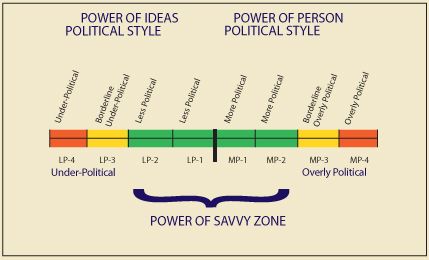Day One
MODULE ONE: The need for organizational savvy
We begin with a “political” wake-up call by:
- outlining a business rationale for entering the ethical politics arena
- providing a positive definition of organizational politics, and
- pointing to signals of politics operating
You may be underestimating the role that politics plays in how your ideas sell or in your career mobility. A Baseline Attitude Activity and a provocative presentation reveal tip-offs that you may not have paid enough attention to the role of organizational politics.
MODULE TWO: Organizational savvy model: two Political Styles (see below)
A continuum shows two contrasting organizational Political Styles. The styles collide, each with a unique world view and a different calculus for evaluating ideas. The clues are revealed for recognizing each style of operating, along with the dangers and liabilities of each extreme. You’ll discuss the risks to the individual, team, and enterprise associated with the two extreme Political Styles and understand the benefits of a third style, one that balances organizational impact with personal integrity.

MODULE THREE: Overview to organizational savvy skill sets: online assessment results and case study
Your online pre-work assignment involves a 65-item Organizational Savvy Self-Assessment or a more potent Multi-Rater Assessment that provides feedback on your effectiveness in 13 Savvy Skill Sets. Whichever assessment your company chooses, you will discuss your personalized results. Next, you’ll analyze and discuss a Case Study from a real corporation, identifying the Political Styles at work and which Savvy Skill Sets could have prevented problems and might lead to a more positive outcome.
- Learn about the Organizational Savvy Self-Assessment or Organizational Savvy Multi-Rater Assessment.
- Review the Savvy Skills Pyramid, which is a visual overview of the Savvy Skill Sets assessed and taught during this workshop.
MODULE FOUR: Savvy attitudes to pierce the emotional veil
Some people react with such an emotional outrage to politics that they are knocked off balance and get hooked. Instead of being crippled by your reactions, you’ll learn to alter your attitudes about organizational politics by taking control of your thoughts and belief systems.
MODULE FIVE: Read power dynamics, know your corporate buzz, and manage negative perceptions
Astute influencers study their companies’ power relationships and unwritten rules to learn how decisions are really made. You’ll plot power trends and then discover your corporate buzz–– how you and your team are perceived (the good, the bad, the ugly)–– and how to manage these perceptions. Understanding your organization’s “scorecard” and your reputation is pivotal to job success, influence efforts, and career advancement.
Day Two
MODULE SIX: Street-smart political strategies
You’ll learn practical action strategies to avoid naiveté and to become more politically savvy. You’ll see that being political need not equate with becoming unethical. It means getting ideas implemented without selling your soul, and living to tell about it. You’ll discover the importance of actions like promoting yourself, building your power base, networking, respecting turf, and addressing hidden agenda.
MODULE SEVEN: Elevator speeches to avoid the shaft
Too many under-political people describe their value to their organizations by simply using their job title. Borrowed from the field of corporate branding, the “elevator speech” strategy will help you to promote yourself with integrity. You’ll sustain your political health through potent body language that conveys a credible image and through the elevator pitch–– a succinct, impactful self-commercial about your contribution to the company.
MODULE EIGHT: Savvy influence vocabulary
Executive presence, building your power base, and political “impression management” all involve being aware of the impact of your behavior. This includes using language and tone that are respectful when disagreeing, non-absolutist when making a call to action, and non-judgmental when proposing an idea or giving feedback. You’ll practice executive vocabulary to avoid unconsciously implying criticism, conveying rigidity, or triggering unnecessary resistance.
MODULE NINE: Ethical lobbying
Savvy leaders understand the need to identify stakeholders and develop a pre-planned, individualized strategy for selling ideas. Customizing a game plan for each decision-maker and seeking support and feedback on your ideas before a meeting is a hallmark of high-integrity politics. You’ll debrief a reading article about Ethical Lobbying and use consulting trios to map out an real-life influence strategy for an actual idea, initiative, recommendation, or proposal.
MODULE TEN: Detecting and handling deception
Even top managers are vulnerable to misrepresented information and manipulation. You’ll learn the types of deception practiced by overly political players and methods for preventing, detecting and handling such ploys.
MODULE ELEVEN: Facing resistance and sabotage
Politically astute executives handle resistance with grace. Often, exploring negative reactions instead of ignoring them earns credibility and respect. You’ll practice a process to stop your communicating or presenting if it’s clear there are issues “under the table”. You’ll practice controlling the situation by non-defensively listening to the issue and responding firmly and objectively.
MODULE TWELVE: Organizational savvy case studies (part two)
Using another real-life scenario from a well-known company, you’ll integrate your learning from these two days. The situation will be discussed in small groups and debriefed in an active fashion in the full group in order to reinforce your understanding of various Political Styles and street-smart action strategies.
